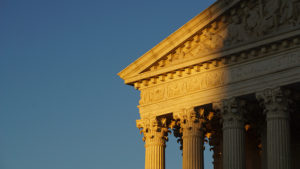Commentary: A Personal View of the Fulton Decision
 Photo by Ian Hutchinson on Unsplash
Photo by Ian Hutchinson on Unsplash Nearly a week later and I still have a bad taste in my mouth regarding the Supreme Court’s decision on Fulton v. City of Philadelphia, Pennsylvania.
Initially, I was outraged—not unlike my previous reaction to the Masterpiece Cakeshop ruling. But media analyses that I saw were mixed. So, I took a breath, slowed my roll, and began to read the opinions. I read articles that ultimately reassured readers of the narrowness of the ruling. I read others opining that the decision is not that straightforward. I talked with my wife and several of our friends who all offered surprisingly differing perspectives—from concern, outrage, and apathy to sentiments of, “We are a big enough country to accommodate and balance the values of both the religious community and the LGBTQ community.” I ruminated on each perspective but inevitably came back to my original conclusion.
Narrow or not, Fulton v. Philadelphia is court-approved discrimination. Discrimination against the legal institution of same-sex marriage; discrimination against LGBTQ foster children; discrimination against science by faith; discrimination against the law by the religious.
Would we feel our country was “big enough to accommodate and balance” this kind of blatant discrimination against other groups? Surely if Catholic Social Services had refused to certify non-Caucasian married couples as foster parents, for example, the court and our nation would not have fallen back on the narrowness of the ruling as a reassuring justification. Surely there would be national outrage.
Same-sex marriage is a legal institution. In the eyes of federal law, as of 2015, my marriage to my wife is no different than any heterosexual marriage. So, it would follow that our fitness to foster children would not be negatively impacted by our legal marriage any more than a heterosexual couple’s fitness to foster children would be. Because marriage, same-sex or not, is a legal institution.
A notable percentage of foster youth are LGBTQ+. According to a study published by Children’s Rights, an advocacy organization focusing on the juvenile justice, welfare, and education systems, 30.4 percent of youth in foster care identify as LGBTQ+ and 5 percent as transgender, compared to 11.2 percent and 1.17 percent of youth not in foster care. Family conflict is the most common cause of LGBTQ+ youth displacement: “For LGBTQ youth, in particular, the conflict tends to be over their sexual orientation or gender identity.”
Not only do LGBTQ+ youth experience harassment, abuse, and/or rejection in their biological homes, they are more likely to experience this in foster care, juvenile justice settings, and homeless shelters. “At times, they’re subjected to dangerous efforts that falsely claim to change their orientation or gender identity…” Which begs the question; wouldn’t the safest, healthiest placement for LGBTQ+ foster youth be with LGBTQ+ foster parents?
And yet, the Supreme Court ruled in favor of a religious institution that openly discriminates against same-sex couples rather than upholding the separation of church and state and federal antidiscrimination laws. The court chose to hang its decision on the narrow specifics of a contract clause rather than uphold the spirit of the law; rather than to protect LGBTQ+ foster youth who do not choose the agency they are sent to, just as they did not choose to find themselves in the foster care system.
Lori Windham, a lawyer for the Becket Fund for Religious Liberty who argued the case on behalf of Catholic Social Services, said, “the Fulton vs. Philadelphia decision is a strong ‘endorsement of religious freedom’ that recognizes that religious social service agencies can serve their communities and that governments ‘should not restrict or exclude them because of their religious beliefs.’”
As an ex-evangelical and someone intimately familiar with the agenda of Christian Nationalism, I agree with Windham that this decision is not too narrow for the Religious Right to celebrate. It is gasoline on the fire of the fervent. A triumph over science. One more brick removed from the wall of church-state separation. Believe me, Christian Nationalists are raising the roofs of revival tents across the nation singing, “Victory in Jesus, Our Savior Forever!”
Maybe it was a narrow ruling. Maybe it can’t be used as a sweeping precedent to overturn other decisions. But for me, an LGBTQ+ mother of four, the court’s ruling is evidence of the broad undercurrent of continuing discrimination against families like mine. And it reminds me that as long as the Christian Nationalist movement is allowed to use religious freedom to nullify the rights of their fellow Americans, the wall of church-state separation is more of a curtain sheer than a barricade.
